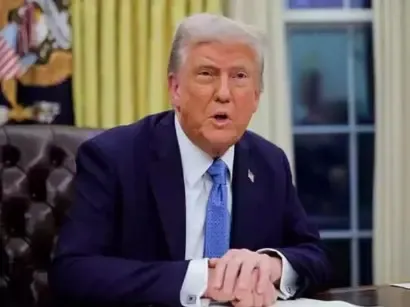Trump Adviser Indicates Tariff Plans Are Still Uncertain Ahead of April 2 Implementation

Synopsis
Key Takeaways
- Trump's tariff plans are still uncertain.
- Hassett emphasizes the President's long-term vision.
- Predictions of tax plan passage by summer.
- Internal discord impacts administration's clarity.
- Canada launches campaign against tariffs.
Washington, March 31 (NationPress) One of US President Donald Trump's leading economic advisers refrained from specifying how many nations would be affected by the President's anticipated reciprocal tariffs this week, indicating that plans remain fluid.
"President Trump is going to decide how many countries," National Economic Council Director Kevin Hassett stated during a segment on Fox News on Sunday.
Hassett seemed to suggest that the President has not reached any conclusive decisions.
"President Trump has a long-term vision of America's golden age, and we're putting in considerable effort to realize that vision in a timely manner. However, I cannot provide any forward-looking guidance regarding this week's developments. The President has a lot of analysis to review before making the right decision," he added.
Hassett also conveyed optimism that Congressional Republicans would successfully pass the President's tax proposal, emphasizing Trump's suggested provisions to eliminate taxes on Social Security, tips, and overtime pay.
He anticipated that the plan could be approved as early as this summer.
As the April 2 deadline for the implementation of new tariffs approaches—a date US President Donald Trump refers to as "Liberation Day"—uncertainty looms over the White House and among administration officials regarding the specifics of the impending trade measures.
Despite public assurances designed to reassure markets, internal disagreements and unpredictable policy changes have led many to question the direction of the Trump administration.
According to a US media report, key Trump officials, including Vice-President J.D. Vance and Chief of Staff Susie Wiles, have privately voiced uncertainty about the President's precise intentions concerning the upcoming tariffs.
The Trump administration's unpredictability was illustrated by the recent implementation of a 25 percent tariff on the auto sector—an abrupt decision that delayed other White House activities and left industry stakeholders unprepared.
Such sudden policy shifts have heightened anxieties among businesses and investors, with Trump stating he "couldn't care less" if automakers increase car prices as a result.
The impending 'reciprocal tariffs' aim to align with the duties that other nations impose on US exports, which Trump considers unfair trade practices. However, the lack of detailed information has left global trading partners uncertain about how to react.
Some countries are actively working to lessen potential repercussions. For instance, Canada has initiated an "education campaign" across 12 US states, utilizing billboards to showcase the economic downsides of tariffs. Messages like "tariffs are a tax on your grocery bill" aim to inform American consumers about the possible domestic effects of trade barriers, according to a report by the New York Post.
As the April 2 deadline approaches, businesses, consumers, and policymakers remain on edge, anticipating definitive guidance from the White House. The administration's internal divisions and Trump's erratic decision-making process continue to fuel uncertainty, leaving many to speculate about the potential outcomes of "Liberation Day".









